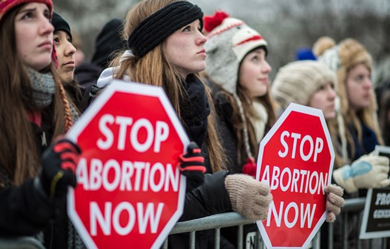Conservative organizations have come out strongly against the UN Convention on the Right of Persons with Disabilities, with Rick Santorum leading the charge. The groups are upset about the treaty ensuring that people with disabilities have equal rights because they claim it is “pro-abortion.”
Article 25 of the Treaty reads in part:
States Parties recognize that persons with disabilities have the right to the enjoyment of the highest attainable standard of health without discrimination on the basis of disability. States Parties shall take all appropriate measures to ensure access for persons with disabilities to health services that are gender-sensitive, including health-related rehabilitation. In particular, States Parties shall:
(a) Provide persons with disabilities with the same range, quality and standard of free or affordable health care and programmes as provided to other persons, including in the area of sexual and reproductive health and population-based public health programmes;
Anti-choice activists are angry about the inclusion of the phrase “reproductive health” in the nondiscrimination clause, according to LifeNews:
Tony Perkins, the head of the Family Research Council, has previously noted the pro-life concerns, saying abortion advocates put language in the treaty in Article 25 that requires signatories to ‘provide persons with disabilities… free or affordable health care including in the area of sexual and reproductive health and population-based health programs.’” “Translation: the global community could force America to sanction sterilization or abortion for the disabled–at taxpayer expense” he said. “Sen. Marco Rubio (R-Fla.) tried to neutralize the threat during the mark-up in the Senate Foreign Relations Committee.
Unfortunately, his amendment (which would have stopped the treaty from forcing abortion policy on countries that sign) was thwarted by Sen. John Kerry (D-Mass.) after a debate.”
Several pro-life groups are on record opposing the treaty, including Eagle Forum, Family Research Council Action, CitizenLink, Concerned Women for America, Liberty Counsel, and others.
In addition, the Home School Legal Defense Association and the Catholic Family and Human Rights Institute (C-FAM) have also came out against ratification.
But Perkins’s claim that the treaty “could force America to sanction sterilization or abortion for the disabled-at taxpayer expense” is simply false.
The State Department makes clear that the treaty “does not include abortion” and the phrase “reproductive health” in Article 25 “does not create any abortion rights, and cannot be interpreted to constitute support, endorsement, or promotion of abortion.”
The Convention is firmly rooted in the principles of equality and non-discrimination. As the Chairperson and many other delegations, including the United States, have noted on countless occasions over the course of negotiations, the treaty reinforces existing rights and is aimed at assuring that persons with disabilities will be treated on an equal basis with others.
This approach was reflected in oral statements and in various places in the written travaux preparatoires, including in a footnote to the draft text of Article 25 that appeared in the report of the Seventh Ad Hoc Committee.
In this regard, the United States understands that the phrase “reproductive health” in Article 25(a) of the draft Convention does not include abortion, and its use in that Article does not create any abortion rights, and cannot be interpreted to constitute support, endorsement, or promotion of abortion. We stated this understanding at the time of adoption of the Convention in the Ad Hoc Committee, and note that no other delegation suggested a different understanding of this term.
Even the National Right to Life Committee reported after the text was adopted that no delegate interpreted “reproductive health” to mean abortion and that “delegates from pro-life nations ultimately accepted this language.” “The committee responsible for enforcing compliance to this treaty would be going way beyond their mandate if they were to interpret the term ‘reproductive health’ to include abortion,” the NRLC said:
The legally undefined and controversial term “reproductive health” remains in the document despite the fact that the term has never appeared in any other UN treaty. However, all parties maintained that the term does not include abortion and that its inclusion in this treaty cannot be interpreted to create any new rights such as a right to abortion.
The final version of Article 25 (a) on health states that nations signing and ratifying the treaty shall: “Provide persons with disabilities with the same range, quality and standard of free or affordable health care and programmes as provided other persons, including in the area of sexual and reproductive health. . . . .”
Delegates from pro-life nations ultimately accepted this language because they were assured and became confident that it does not include abortion or create any new human rights such as a right to abortion.
For example, during the debate the Treaty Chairman, Ambassador McKay of New Zealand, stated repeatedly that the use of the term “reproductive health” in this treaty does not create any new human rights such as abortion. He even added a non-binding footnote to the record of negotiations, not the treaty itself, which he claimed would preclude any such misinterpretation of the term.
Numerous delegates from nations throughout the world including the European Union agreed with Chairman McKay that the term “reproductive health” does not include abortion. No delegate from any nation stated that it does.
In light of all these statements and the language of the treaty, the committee responsible for enforcing compliance to this treaty would be going way beyond their mandate if they were to interpret the term “reproductive health” to include abortion. It is crucial that they do not because nations that sign and ratify a treaty are required to change their laws in order to comply with the treaty.
But for the Religious Right, even definitive evidence that the treaty’s language does not refer to abortion doesn’t change their mind that the Convention on the Right of Persons with Disabilities must be defeated.








